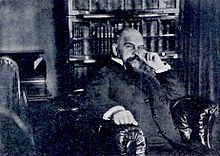Nikolaus Hartwig
Nikolaus Hartwig (also: Nikolaus von Hartwig , Russian: Николай Генрихович Гартвиг , Nikolai Genrichowitsch Gartwig ; * December 16, 1857 in Gori ; † July 10, 1914 in Belgrade ) was a Russian diplomat and ambassador to Persia and Serbia . As a committed Pan-Slavist , he had a strong influence on the Serbian government and supported Serbia's expansionist efforts against the Ottoman Empire , Bulgaria , Albania and Austria-Hungary . These efforts were among the triggers of the First World War .
Life
Nikolaus Hartwig was born in Gori, Georgia , on December 16, 1857, the son of an ennobled family of German descent . His career as a diplomat began in 1875 when he joined the Asia Department. During that time, Hartwig published articles in the pro-Serbian Russian newspaper Novoje wremja , in which he advocated a Pan-Slav empire and a tougher course for Russia in the Middle East. These publications brought him recognition in the Russian General Staff and with Tsar Alexander II and led to his promotion to head of the Asia department in 1900. He was close to the Foreign Minister, Count Lamsdorf , and was even discussed as his successor in 1906. Lamsdorf's successor, however, was Hartwig's rival Alexander Iswolski .
Russian ambassador to Persia
Isvolsky refused to comply with Hartwig's request to send him as ambassador to Constantinople (now Istanbul), and instead sent him to the Persian Empire, which is politically less "important" for Russia. Nikolaus Hartwig saw his appointment as the Russian ambassador in Tehran (1906–1908) as a time in exile. He resisted his superiors in Saint Petersburg and pursued his own politics, for example by sabotaging the negotiations on the division of Persia between the colonial powers Great Britain and Russia in the Treaty of Saint Petersburg and helping to prevent the overthrow of the Persian ruler Mohammed Ali Shah : He had the British branch surrounded by the Russian-led Cossack Brigade so that the British could not offer asylum to the subversives. The British ambassador no longer spoke to Hartwig. Both countries exchanged their ambassadors in Tehran to restart the Persia talks. Hartwig came back to St. Petersburg.
Russian ambassador to Serbia
In 1909, Iswolski had to resign from the post of Russian Foreign Minister as a result of the snub against Russia through Austria-Hungary's annexation of Bosnia-Herzegovina . He had previously approved the annexation, but denied it afterwards. Tsar Nicholas II campaigned for a strong union of Slavic countries under Russian influence and therefore favored Hartwig as Isvolsky's successor. Here, too, Hartwig lost a power struggle, and he was sent back into the field as a diplomat, this time to Belgrade for strategic reasons. During his work as ambassador there (1909–1914), he repeatedly exceeded the framework prescribed by the Foreign Ministry and helped determine Serbian politics through his friendship with Serbian Prime Minister Nikola Pašić . Hartwig was a key figure in the 1912 alliance between Serbia, Bulgaria , Greece and Montenegro . In agreement with his superior, Russian Foreign Minister Sasonov , he understood this “ Balkan Alliance ” as an instrument against Austria.
After the murder of Franz Ferndinand of Austria on June 28, 1914, the political mood in Southeastern Europe intensified. At a meeting between Nikolaus Hartwig and the Austrian Minister for Serbia, Baron von Giesl , on July 10, 1914, Hartwig suffered a heart attack. The Frankfurter Zeitung wrote:
“Belgrade, July 11th. (WB) The Russian envoy v. Hartwig paid the Austro-Hungarian ambassador Frhrn yesterday evening. v. Giesl paid a visit. Hartwig appeared at 9 o'clock in the evening in the palace of the Austro-Hungarian legation and was greeted by Frhrn. v. Giesl received in his work cabinet. Hartwig had taken a seat on the sofa while Frhr. v. Giesl sat across from him. During the conversation, which was conducted in a very conciliatory tone, v. Hartwig suddenly raised his hand to the region of the heart, lowered his head and fell from the sofa to the floor. Mr. v. Giesl immediately leaned over to him and him onto the sofa. The embassy staff immediately attempted resuscitation. The first doctor was there after five minutes. Immediately after his arrival, Mr. Hartwig opened his mind. The political situation was not relieved by the death of one of the most capable champions of the Russian-Serbian position. "
The Serbian press published several articles alleging that Hartwig was poisoned in Austria. At the request of the Serbian government, Nikolaus Hartwig was buried in Belgrade. Much Serbian celebrities, including the Prime Minister, attended the funeral service.
literature
- Helmreich, Ernst: The Diplomacy of the Balkan Wars, 1912-1913 . London: Oxford University Press, 1938.
- Janner Jr., William: The Lions of July: Prelude to War, 1914 . Novato: Presidio Press, 1996.
- Kazemzadeh, Firuz: Russia and Britain in Persia, 1864-1914: A Study in Imperialism . New Haven: Yale University Press, 1968.
- Rossos, Andrew: Russia and the Balkans: Inter-Balkan Rivalries and Russian Foreign Policy, 1908-1914 . Buffalo: University of Toronto Press, 1981.
Web links
- Entry in the Erik Amburger database
| predecessor | Office | successor |
|---|---|---|
| Alexis de Speyer | Russian envoy in Tehran 1906–1908 |
Stanislaw Alfonsowitsch Poklewski-Koziell |
| Vasily Sergejewitsch Sergejew | Russian Envoy Extraordinary and Minister Plenipotentiary in Belgrade 1909–1914 |
Grigory Nikolaevich Trubetskoy |
| personal data | |
|---|---|
| SURNAME | Hartwig, Nikolaus |
| ALTERNATIVE NAMES | Hartwig, Nikolaus von; Hartwig, Nikolai; Gartwig, Nikolai Genrichowitsch (Russian, transcribed); Гартвиг, Николай Генрихович (Russian); Hartwig, Nicholas |
| BRIEF DESCRIPTION | Russian diplomat and ambassador to Persia and Serbia |
| DATE OF BIRTH | December 16, 1857 |
| PLACE OF BIRTH | Gori |
| DATE OF DEATH | July 10, 1914 |
| Place of death | Belgrade |
